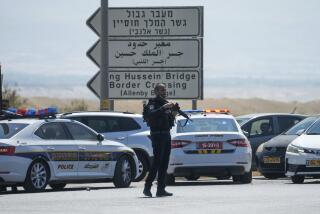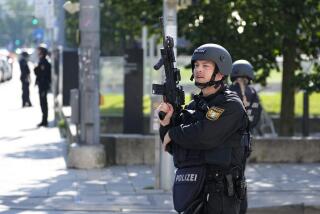Gunman in Israel Army Uniform Kills Arab, Wounds 3
- Share via
JERUSALEM — A gunman in an Israeli army uniform opened fire on four Arabs loitering outside the wall of Jersualem’s increasingly tense Old City on Monday night, killing one and wounding the other three, according to the police and an account given by a survivor.
The shooting took place just 50 yards from the Jaffa Gate, a main entrance to the Old City, which is home to historic shrines of the Jewish, Islamic and Christian faiths. Strolling tourists in tears were turned away from the spot where police investigators photographed the body of Hared Shawish, a blacksmith. A large red smudge stained the 400-year-old wall behind Shawish’s body.
The gunman escaped on foot toward the Mamilla neighborhood, an abandoned district of ruins left over from the 1967 Six-Day War, police said.
‘Probably’ an Israeli
Jerusalem Police Chief Josef Yehudai told Israeli government radio that the gunman was “probably” an Israeli. He added that the weapon used was an Uzi submachine gun of the type carried by many reserve soldiers and Israeli settlers who live in the occupied West Bank and Gaza Strip. After the shooting, police beefed up patrols in the Old City to prevent a violent reaction.
Later in the evening, the radio received a call from someone claiming responsibility for the shooting on behalf of the Sicarites, a shadowy underground Jewish group. During the past few months, the Sicarites have been linked to vandalism of the homes and autos of several Israeli peace proponents.
Mahmoud Mohammed Zadi, 20, who survived the shooting with wounds to his left shoulder, right arm and thigh, described an apparently cold-blooded, spur-of-the-moment shooting.
“We were sitting on the grass outside the wall and a man in an army uniform walked by and looked at us,” said Zadi, who is a waiter at the Hilton Hotel here. “He walked on and then came back and shot. He said nothing.”
Zadi hobbled to a passing taxi that took him to Mokassed Hospital on Jerusalem’s Arab east side. The other two survivors, who along with Shawish were friends of Zadi, were treated at Israeli hospitals. One is in serious condition with a head wound.
The shooting came on a day that Israeli officials clamped restrictions on Muslim access to the grounds of Al Aqsa mosque inside the Old City. The measures, which include forbidding Palestinian youths from entering, are designed to prevent a repeat of last Friday’s rock-throwing riot at the mosque.
Scene of Little Violence
During the 17-month-old Arab uprising, Jerusalem has been the scene of less violence than the major cities in the West Bank and Gaza Strip. But in recent months, a spate of incidents has raised the temperature in the ethnically divided city. Early in the year, a curfew was placed on the Arab suburb of Silwan after an outbreak of stone throwing.
From time to time, Arabs throw rocks or gasoline bombs at passing Israeli army patrols.
In February, a young Jewish worshiper on his way to the Western Wall to pray was stabbed to death by a gang of Arab youths. Last Friday, the first day of the Muslim holy month of Ramadan, violence broke out at Al Aqsa when a mob of Palestinians unfurled banners and chanted Muslim and anti-Israeli slogans. Police fired in the air and the Arabs threw stones. Some of the rocks rained down on the plaza at the adjacent Western Wall where numerous Jews were praying.
During the coming weeks, police said, they will check the identification of all Arabs entering the mosque complex.
Elsewhere, a prison authority spokeswoman at Ramle in central Israel said guards fired tear gas to quell a riot by Palestinian inmates at a security prison there, wire services reported.
Most of the prisoners were serving sentences for security offenses committed during the uprising. The cause of the disturbance was under investigation, she said.
Three Supreme Court judges, meanwhile, visited the Edh Dhahiriya detention camp south of Hebron in the West Bank to examine complaints by the Assn. for Civil Rights in Israel about prison conditions. The group’s lawsuit alleges overcrowding, unsanitary conditions and abuse of prisoners at the camp, where hundreds of Palestinians arrested during the uprising are held.
More to Read
Sign up for Essential California
The most important California stories and recommendations in your inbox every morning.
You may occasionally receive promotional content from the Los Angeles Times.













